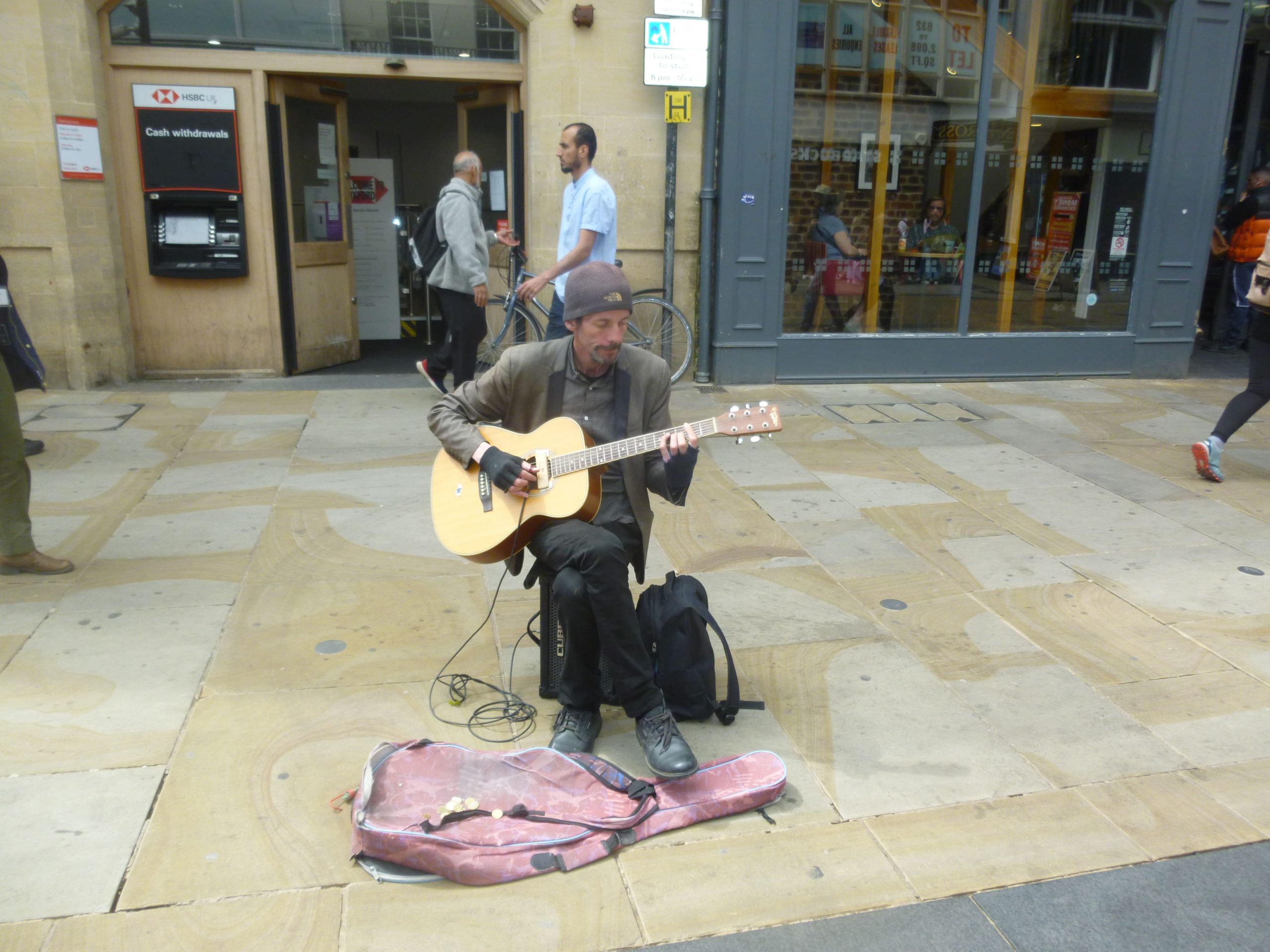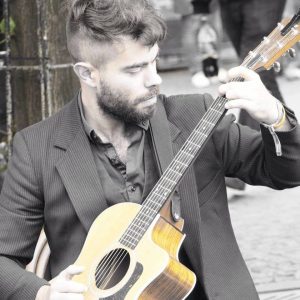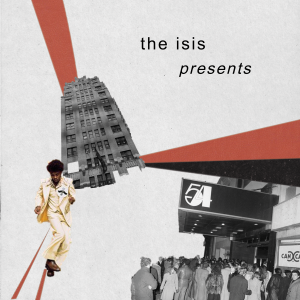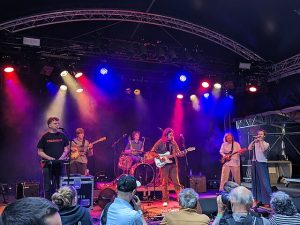
Henry McGuinness: an interview with an Oxford busker
by Flora Bigham | October 31, 2023
Walk down Cornmarket or Westgate and at any given moment your journey will be set to the soundtrack of experimental synthesiser tracks (a recent highlight last week), a hand-wound organ, or Lana Del Rey covers. Henry McGuiness is a guitarist who devises such soundtracks to many Oxford-resident’s daily walks. I met him over a coffee to delve into the world of busking.
Although perhaps not acknowledged by pedestrians rushing past, the art of busking is not an easy task: “You’re always watching”, Henry tells me, “always trying to catch the mood in the street … thinking about how the music will fit with the people who are going by. There’s the mood Oxford has day to day, [everyone] going past pretty quickly. Other days [are different] just depending on the weather, partly, and how everyone slept so … it’s very intuitive.” What are a few staples of his repertoire, tunes which always seem to lift the mood of the street, or catch peoples’ ears? “There’s a Bach Suite in E, which is a violin partita, and that’s really popular. There’s a piece from a French film Les Jeuxs Interdit, it’s really easy to play as well.” A few 70s and 80s classics are also popular, particular highlights being ‘Every Breath You Take’, ‘Only You’, and ‘Hotel California’.
Henry began playing guitar when he was fourteen, inspired by watching TV and seeing “these guys playing guitar and [thinking] I want to do that”. Hearing tunes, he would then work them out on the guitar, motivated by wanting to be “good at something”. He arranges all the tunes himself, adding his own style and flair, particularly to the more classical side of his setlist. “When I play Bach, I put vibrato and trills and I can just hear a chorus of Bach scholars saying that he wouldn’t have done that, because there are purists in music.” But “to keep music alive, it’s just the person playing. We get [purism] in the guitar world a lot. Folk guitarists saying he’s not playing that properly, he’s using snazzy techniques. I was listening to an interview on YouTube with the blues guitarist Albert King and he’s sort of putting Jimi Hendrix down, saying ‘Ohh, he wasn’t doing it properly. He was using too many tricks’, and it just sounded like jealousy really. All these kind of purist attitudes seem like jealousy.” He is currently working on some Benjamin Britten, which is different as the piece is in an unusual 5/4 time signature, and another 5/4 piece called ‘Mysterious Habitats’ by the Yugoslavian composer, improviser, and guitarist Dušan Bogdanović. “Quite a lot of these songs have the same patterns,” Henry elaborates, “but often, I’ll have the song in my head because I just heard it, songs I know and love I can hear in my head. I can then find where the notes and the chords are, and the harmonies.”
When he first started busking it was difficult getting the right kind of sound and volume levels: “it’s good assertiveness training as well, [at first asking] ‘do you mind if I play?’, but within about three weeks, you know, ‘it’s my turn’.” Getting the volume levels right is something readers may feel familiar with: being bombarded by intense saxophone at 9am is not always the best way to start the day. “I mean, some are pretty noisy, but he [the saxophonist] said that the louder he was … the more attention [he got]. But I often play in the morning, and I want more sensitive sounds so people can hear the vibrato and the tone. You don’t want to play too loud in the morning. People aren’t ready for it.” With some buskers playing at high volumes, does this jeopardise a sense of community between buskers at all? “We all know each other…and some people become friends and then we help each other out. It’s kind of a competition as well … [but] at the moment things are quite relaxed. In other cities, like Bath, they meet in the morning and arrange where everyone is going to go … but [in Oxford] it’s all pretty positive.” There was one instance though, with someone who had a microphone and sounded “a bit like a Dalek walking up and down in front of me and I did ask him to stop, but I get on with him … There’s [another] chap who’s very shouty, but I’m friends with him. You respect each other’s space. Most of them just want to get on with other people. Occasionally you get someone who … won’t compromise in any way … ‘this is my space and I’ll do what I want until the police come and stop me’, but you can’t be playing music having got very, very angry with someone, you need to be in the right mood.” The main interaction is with the audience, with Henry reiterating that you need to gauge your mood and playing to match the mood of the street: “it’s as much about meeting members of the public … people just come and say ‘oh, what a lovely piece’, it’s very nice. It’s only one person in a thousand who would comment [negatively]. Someone did that the other week but it’s alright, you have got to expect it. I laughed when he said that, but there are enough people who seem to like it.”
This interaction with the audience through music is important, but ultimately music “is really self-expression”, Henry says. “I want to play something that I enjoy playing and hopefully it fits to what other people want to” – “everyone’s got something to express, something to say”, and music is where this happens, where we can translate our real-life experiences into something artistic. “Luckily when I was learning I kept finding music I liked, that was really important. New things to learn, new ways to play, and new things to say. We all have something we want to say, in music, everyone does” and that is where inspiration lies, “that’s really where it happens – real-life.” Any impression or advice to be taken is to “enjoy your life because we never know when we’ll be gone”, live life being “you as you.” I thank Henry for these words of wisdom before heading outside, met with the dulcet tones of the saxophone introduction to ‘Careless Whisper’.∎
If you would like to hear Henry’s arrangements and compositions, here is a link to his YouTube channel entitled “Henry McGuinness Guitar”: https://www.youtube.com/@HenryMcGuinnessGuitar
Words and photography by Flora Bigham.




